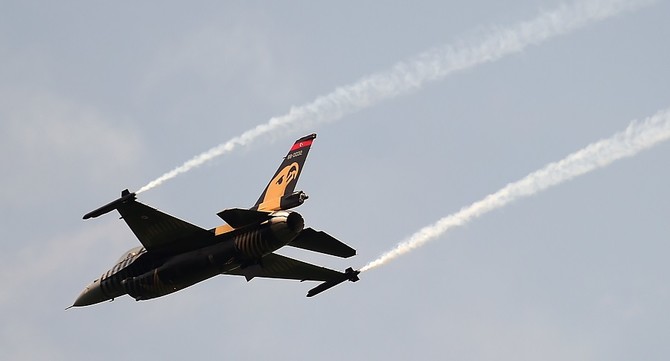BEIRUT: Turkish artillery on Sunday bombarded Kurdish militia positions on the eastern shore of the Euphrates River in northern Syria.
The shelling came two days after Turkish President Recep Tayyip Erdogan issued a “final warning” to anyone who endangered Turkey’s borders, and said Ankara would focus its attention on Syrian Kurdish fighters east of the river.
The bombardment targeted YPG militia forces in the Zor Magar area to the west of northern Syria’s Ayn Al-Arab region. Turkey considers the YPG a terrorist organization and an extension of the outlawed Kurdistan Workers’ Party (PKK).
The rare Turkish shelling east of the Euphrates comes a day after an international summit on Syria hosted by Turkey, which called for an inclusive political process and for creating conditions to allow the return of millions of refugees.
Speaking at the summit, Erdogan said Turkey has been among those most harmed by “terror organizations” in neighboring Syria.
“We will continue eliminating threats against our national security at its root in the Euphrates’ east as we have done so in its west,” Erdogan said.
Turkey’s official Anadolu news agency said Turkish artillery strikes Sunday hit trenches and positions built by the YPG on a hill in the village of Zor Moghar, in rural northern Aleppo.
The village is across the Euphrates River that separates Turkey-backed Syrian opposition forces and the YPG.
The YPG said in a statement the shelling killed a Kurdish fighter from the Self Defense Forces. The newly formed forces are affiliated with the US-backed Syrian Democratic Forces, leading the fight against Daesh in eastern Syria.
The YPG said the Turkish shelling was “unprovoked” and is a distraction from the fight against Daesh in eastern Syria.
“Any illegitimate attack against northern Syria will not go unanswered,” the YPG said in a statement.
The Britain-based Syrian Observatory for Human Rights and Kurdish Hawar news agency also reported the shelling, saying Turkish artillery targeted other villages east of the Euphrates as well. Hawar said there were no reports of casualties.
The Observatory said the shelling in the villages west of Kobani, a stronghold of the Kurdish fighters, came while Kurdish fighters were on high alert following Turkish threats.
The YPG took control of large areas of northeast Syria in 2012 when Assad regime forces pulled out. The militia forms the backbone of the Syrian Democratic Forces (SDF), the Kurdish-Arab alliance that has received extensive US support in the fight against Daesh.
That support is a major point of contention between the US and Turkey, and a large-scale offensive east of the Euphrates could aggravate already tense relations.
Turkey has also repeatedly threatened an attack on the YPG-controlled Syrian city of Manbij, where US troops are deployed.
To ease tensions, Washington and Ankara agreed on coordinated patrols around the city, one of which took place on Sunday.
Further east in Syria, Daesh drove the SDF from the Hajjin pocket near the Iraqi border early on Sunday, after two days of fighting.
The SDF, backed by US-led coalition air strikes, launched its campaign to recapture the Daesh holdout on Sept. 10, but have faced a fierce fightback from the militants.
The Syrian Observatory for Human Rights said 72 SDF fighters were killed as Daesh took advantage of a sandstorm that hampered coalition air cover and dispatched suicide bombers as part of their fightback.






















